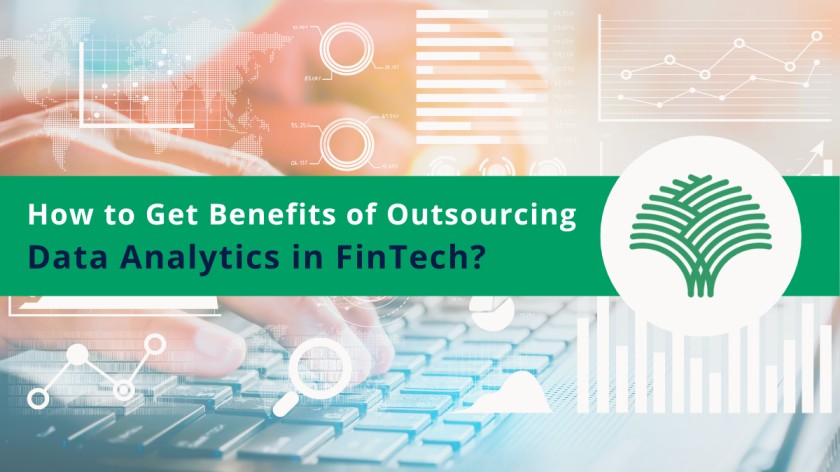
How to Get Benefits of Outsourcing Data Analytics in FinTech?
You may be aware of the term Big data. Most of you may also be mindful of the nuances related to it. For those unaware, Big Data is a collection of vast volumes of data that continues to grow with time. In addition, it usually refers to data that is so large and complex that traditional methods and tools of analysis no longer apply to it. In short, big data is just data but with huge volumes.
Proper analysis of Big data helps organizations make better decisions based on intelligent outside intelligence. For instance, access to social data from search engines and social media platforms such as Facebook assists organizations in breaking down the characteristics of their customer segment even better. Similarly, the latest consumer feedback systems backed by Big Data are helping organizations to anticipate issues early on and thus provide better service.
The proverb, “data is everything,” holds very true in today’s consumer market. This is the reality of the Fintech and Financial services market as well. A FinTech company that can draw actionable insights from the raw data has all the power in the vast market.
As the proverb goes, “data is everything,” not just in FinTech enterprises and Financial Services but in every industry. The actual power lies in turning raw data into valuable, actionable insights. Now imagine, what would it mean for a bank or an NBFC to swiftly analyze every piece of data and use it to improve the client experience and develop a better offering than your competitor? Time is of the essence, and so is data analytics in fintech.
FinTech startups and enterprises use insights from data analytics to make significant business decisions. The business output of the FinTech industry has increased manifold with the help of technologies like the Internet of Things (IoT), Artificial Intelligence/ Machine Learning (AI/ML), and more. To gain the upper hand in the market, many companies are increasingly outsourcing data analytics in fintech. The industry has undoubtedly understood its importance and is quickly embracing it.
Application of Big Data Analytics in a FinTech Firm
- Big Data in Digital Payments:
- Total transaction value in Digital Payments is projected to reach US$8.49tn in 2022. With this growth in the digital payments sector, Fintech uses data analytics for fraud detection and security control purposes.
- The new online mechanism of an instant loan for online purchases has led to the integration of ML and big data to assess the risk of the loan. This has improved the conversion rates of the organizations.
- Big Data in Insurance:
- According to old age traditional methods, the FinTech solutions had to go as per manual pricing on their policies and, because of that, missed out on substantial financial opportunities.
- Modern insurance companies work with a FinTech app development company to design tools and applications to analyze statistical, demographic, and other big data to calculate potential in a business opportunity and create a low-risk insurance product.
- Big Data in Credit Companies:
- Lending institutions can use AI and big data analytics to provide loans to businesses and individuals. First, this helps a FinTech firm promote the financial inclusion of the target audience.
- Secondly, increased lending would mean good business for the organization.
Read More: The Best FinTech Development Technology Stack in 2022
Benefits of Outsourcing Data Analytics for FinTech Companies
- Enhanced Security:
- Fraud and scams are a significant security threat to the digital finance sector. Data analytics helps FinTech products and services organizations establish reliable fraud prevention systems by identifying unusual transactions.
- FinTech enterprises can also utilize technical systems to inform consumers about potential security issues and help them keep their funds safe.
- Scalability:
- Another good reason why FinTech startups and other established organizations must outsource fintech app development and subsequent data analytics is that it enables you to become more adaptable with increased speed and agility to outdo your competition.
- It helps the organizations improve service delivery while expanding their business outreach to global levels.
- Cost Saving:
- In the case of outsourcing in general, outsourcing FinTech projects such as data analytics also helps the financial sector businesses save costs while enhancing their business processes.
- This also reduces the in-house cost and resource need of maintaining an in-house data analytics team.
- Leaning on Experts:
- In most cases, a FinTech business may have all the expertise to deliver an exceptional service to the target customer. However, at the same time, they might not have the technical knowledge of data analytics.
- By outsourcing FinTech data analytics needs, you can avoid getting into utterly different expertise altogether with little to no experience.
- Utilizing Robotic Automation Bots and Chatbots:
- By outsourcing your needs to a FinTech software development outsourcing company, you can get chatbot developed. The bots can handle various tasks such as processing transactions, critical information, and transaction processing.
- RPA helps to improve the user experience by taking over repetitive tasks without requiring human contact. As a result, it reduces errors and frees up team members to handle more complex issues.
- Multiple Options:
- The outsourcing partners have experience serving various clients across industries. Therefore they may provide you with numerous options for FinTech development for data analytics.
- Amongst all the options, you can select the most viable option amidst all the possibilities.
- Tailored Solution for Data Analytics:
- By Investing in fintech app outsourcing, you can assure yourself of getting customized FinTech software solutions that help your team analyze customer sample data thoroughly.
- This way, you can carefully explore every necessary aspect of customer data, from credit scores to users’ buying patterns, and thus make more informed decisions.
Check out the success story of our loan management app
Conclusion
The days of using traditional methods for managing the operations of FinTech enterprises are far behind. Instead, the new-age Fintech companies are embracing the technological capabilities of AI/ML and data analytics to ensure better operational efficiency.
Big data analytics allows fintech companies to provide secure and scalable solutions at a controlled cost. In addition, outsourcing data analytics will enable you to delegate the activity of your most minor expertise to third-party experts. This saves both your cost and time that can be put into more necessary and creative ventures.
Contact us today for a FREE CONSULTATION.




